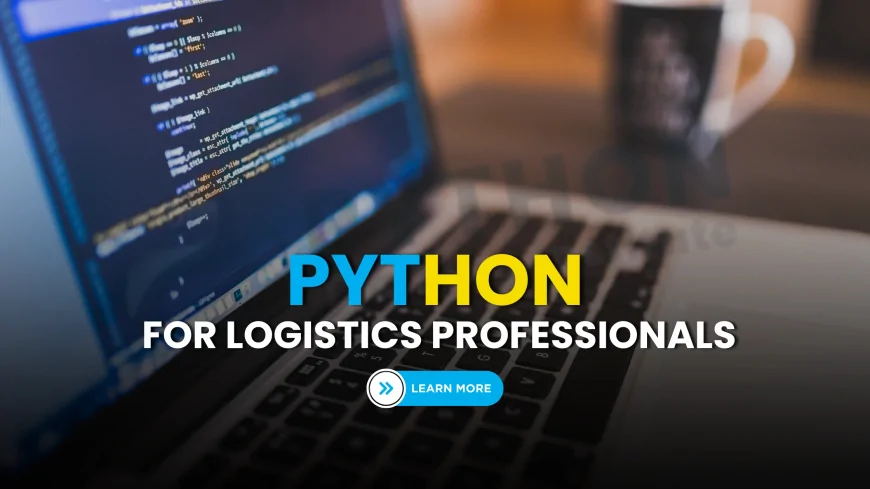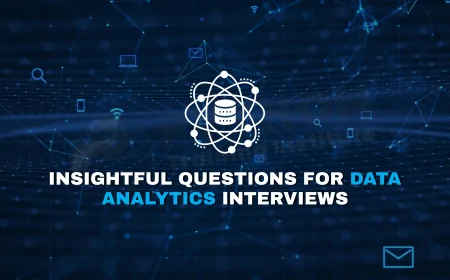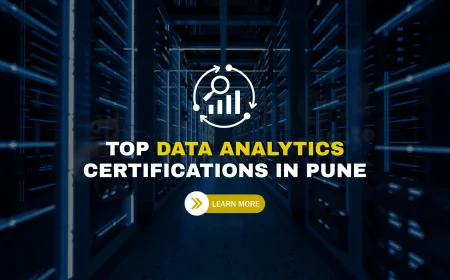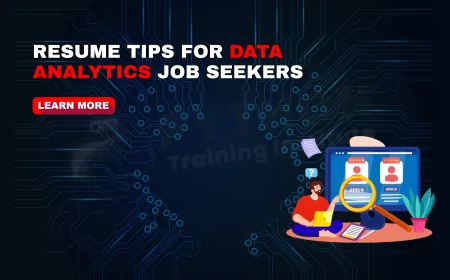Python Training for Logistics Professionals Pune | Python Programming for Logistics Professionals in Pune
Enroll in Python training for logistics professionals in Pune. Learn automation, forecasting, data handling, and supply chain optimization with Python.

Table of Contents
- Overview
- Why Logistics Professionals Should Learn Python
- Career Benefits of Python in Logistics
- Who Should Join
- Course Outline
- Tools & Technologies Taught
- Real-World Projects in Logistics
- Python Use Cases in Logistics
- Top Institutes Offering Python for Logistics in Pune
- Course Duration and Fee
- Certification & Career Scope
- FAQs
- Conclusion
Overview
Python is widely used in logistics and supply chain management to automate routine tasks, optimize routes, analyze delivery trends, and make data-driven decisions. Specialized Python courses in Pune now offer tailored learning modules that integrate logistics case studies with practical Python skills.
Why Logistics Professionals Should Learn Python
- Automation: Automate warehouse tasks, invoice processing, or route planning.
- Data Analysis: Analyze delivery patterns, inventory turnover, or demand forecasting using Pandas/NumPy.
- API Integration: Use Python to connect with ERP, WMS, or CRM systems.
- Forecasting: Predict stock-outs, shipment delays, and seasonal demand shifts using Python’s ML libraries.
Career Benefits of Python in Logistics
- Gain an edge in tech-driven logistics firms
- Open doors to roles like Operations Analyst, Logistics Data Engineer, or Supply Chain Analyst
- Improve in-house efficiency and workflow as a mid-level manager
- Enhance decision-making with real-time dashboards and data visualizations
Who Should Join
- Logistics coordinators and analysts
- Warehouse supervisors and planners
- Supply chain managers
- Operations and procurement professionals
- Engineers in logistics startups or 3PLs
Course Outline
- Python basics: Variables, loops, functions, conditionals
- Data types and file handling
- Libraries: NumPy, Pandas, Matplotlib for logistics datasets
- Working with Excel/CSV shipment files
- API integration: REST APIs with logistics tools
- Basic automation with Python scripts
- Logistics-specific project: Shipment tracker, delivery optimizer, stock reordering system
Tools & Technologies Taught
- Python 3.x
- Pandas, NumPy, Matplotlib, Seaborn
- OpenPyXL, CSV, JSON
- Flask (for dashboards and internal tools)
- Git and GitHub
- Jupyter Notebook or VS Code
Real-World Projects in Logistics
- Shipment Tracking Dashboard: Integrate CSV shipment data with Python for visualization
- Warehouse Inventory Automation: Python script that updates stock levels automatically
- Route Optimization: Use Python algorithms to find the shortest delivery route
- Demand Forecasting: Apply Python ML libraries to historical order data
Python Use Cases in Logistics
- EDI automation
- Delivery failure prediction
- Invoice generation scripts
- Barcode scanning automation
- Cost optimization through simulation
Top Institutes Offering Python for Logistics in Pune
WebAsha Excels in Python Training for Logistics Professionals
- Live Project & Logistics-Focused Case Studies: WebAsha includes real-time projects tailored to logistics scenarios, such as shipment tracking, inventory dashboards, Excel automation, and route optimization—alongside standard Python modules.
- Customized & Job-Oriented Curriculum: The course is structured to address logistics-specific challenges, while still delivering core Python alongside Pandas, NumPy, and Flask for dashboarding.
- Live Instructor-Led Sessions & Small Batches: Interactive training in small groups ensures personal attention and direct mentor support.
- Flexible Learning Modes: Offers classroom sessions in Pune and live online training, including weekend and evening batches with recording access.
- Strong Career & Placement Assistance: WebAsha provides mock interviews, resume help, job referral portals, and boasts a 90%+ placement record.
Course Highlights: Practical & Logistics-Relevant Modules
- Core Python Essentials: Variables, loops, functions, OOP, file handling
- Data Analysis for Logistics: Pandas and NumPy for shipment and warehouse data
- Excel Automation: Using Python libraries like OpenPyXL and CSV handling
- Interactive Dashboards: Using Flask to build management tools for logistics workflows
- Real Project Deployments: Complete deployment and hosting of logistics projects on GitHub or cloud platforms.
Ideal for These Professionals
- Logistics coordinators and analysts seeking automation skills
- Warehouse managers aiming to build tracking dashboards
- Supply chain professionals needing data-driven decision tools
- Operations leads looking to streamline reporting and transparency
Course Duration and Fee
- Duration: 6–8 weeks
- Batches: Weekday, weekend, or self-paced with mentorship
- Fee Range: ₹12,000 – ₹25,000 depending on level and batch type
Certification & Career Scope
You’ll receive a recognized certification upon completion. Some institutes also offer an internship letter or project portfolio certification. You can apply for roles such as:
- Logistics Automation Engineer
- Supply Chain Analyst (Python)
- Data-Driven Operations Executive
- Process Optimization Specialist
FAQs –
1. Is this course suitable for non-programmers?
Yes, it starts from Python basics and builds up to real logistics projects.
2. Will I learn data handling with Excel or CSV files?
Yes, you’ll learn how to read, clean, and analyze logistics data formats.
3. What is the duration of the course?
Usually 6 to 8 weeks depending on institute and batch schedule.
4. Can I learn this course online?
Yes, institutes in Pune like WebAsha offer live online and hybrid modes.
5. Are live projects included?
Absolutely. Projects like inventory automation, shipment tracking, and route optimization are part of the syllabus.
6. Will I get a certificate?
Yes, you will receive a course completion certificate and optionally a project/internship letter.
7. Do I need to buy software?
No. All required tools (like Python, Jupyter, VS Code) are free and open-source.
8. Are these courses job-oriented?
Yes. They are aligned with job profiles in logistics, automation, and data analytics.
9. Will this help in getting a promotion?
Yes. It empowers you with tech-driven process optimization skills valued in mid-level and managerial logistics roles.
10. Is Python used in warehouse automation?
Yes. Python is used to script inventory updates, barcode scanning, and movement logs.
11. What if I miss a session?
Most institutes provide recorded videos or allow repeat classes.
12. Will I learn visualizations?
Yes. Tools like Matplotlib and Seaborn are taught to create logistics dashboards.
13. Do I get project guidance?
Yes. Mentors guide you in planning, coding, and reviewing your logistics-based projects.
14. Can I do this alongside my job?
Yes. Weekend and evening batches are designed for working professionals.
15. Will there be interview preparation?
Yes. Many institutes offer resume building and mock interviews after course completion.
16. Is Python useful for ERP or SCM software?
Yes. Python can connect to ERP APIs and automate SCM workflows.
17. Are there beginner and advanced levels?
Yes. You can choose based on your experience level, or start with beginner and upgrade.
18. Will I learn to connect Python with databases?
Yes. You’ll learn SQL integration and working with shipment/inventory databases.
19. Can I switch to a data analyst role after this?
Yes. With the right project portfolio, logistics professionals can transition to analytics roles.
20. Are projects reviewed by mentors?
Yes. You’ll get feedback and corrections to ensure project quality and readiness.
Conclusion
As logistics becomes more digital and data-driven, knowing Python is no longer optional—it's essential. Whether you're planning routes, automating tasks, analyzing shipments, or managing warehouse systems, Python gives you the edge in today’s logistics job market.
Python Training for Logistics Professionals in Pune is the smart step toward better career opportunities, optimized workflows, and future-ready logistics roles. With hands-on learning, real-time projects, and expert mentorship, these courses help you unlock the power of Python for logistics innovation.
What's Your Reaction?
 Like
0
Like
0
 Dislike
0
Dislike
0
 Love
0
Love
0
 Funny
0
Funny
0
 Angry
0
Angry
0
 Sad
0
Sad
0
 Wow
0
Wow
0















